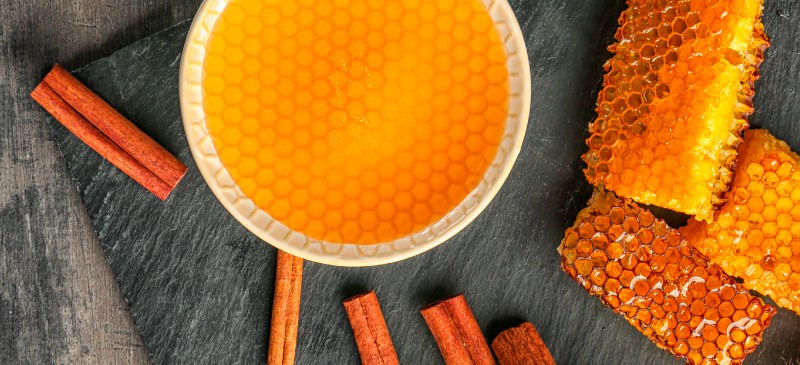
Honey and cinnamon have been used since ancient times to support human health and wellness. Honey has a rich history dating back to ancient Greek, Roman, Vedic and Egyptian texts, while cinnamon has been used in Chinese and Ayurvedic folk medicine for over 2,000 years.
We know that, individually, both cinnamon and honey possess powerful therapeutic properties. What about when you use them together?
If one is good by itself, does that mean that the two combined can be even more beneficial? Here’s what you need to know about the combination of honey and cinnamon.
Benefits of Cinnamon
1. Rich in Antioxidants
A major benefit of cinnamon is its antioxidant content. This helps reduce free radical damage and slow the aging process.
Researchers have identified at least 41 different compounds in cinnamon with health-promoting capabilities.
2. Has Antimicrobial Properties
Because cinnamon has antimicrobial properties, it can be used to optimize oral hygiene, fight infections and support skin health. Research suggests that it helps improve bad breath and tooth decay, ease respiratory issues like the common cold and sore throat, and soothe skin irritation, redness and swelling.
3. Relieves Inflammation
The flavonoids in cinnamon have been proven to help alleviate inflammation, reduce swelling, ease muscle soreness and lessen the severity of allergic reactions.
4. Protects Heart Health
Research shows that cinnamon may reduce several of the most common risk factors for heart disease, including high cholesterol levels, high triglyceride levels and high blood pressure. It may be a helpful blood coagulant that helps the body form blood clots and promotes circulation.
5. Stabilizes Blood Sugar
Studies indicate that cinnamon has anti-diabetic effects and can lower blood sugar levels and improve sensitivity to the hormone insulin. This is what makes it one of the best foods for diabetics.
6. Supports Brain Function
Antioxidants in cinnamon have been found to help defend against the development of neurological disorders, such as Alzheimer’s disease and Parkinson’s disease.
Benefits of Honey
1. Helps Fight Allergies
The bee pollen in honey helps boost immunity and can improve allergy symptoms with a concept called immunotherapy. Studies indicate that consuming local pollen reduces a person’s sensitivity over time, thereby reducing allergy symptoms.
2. Provides Antioxidants
A daily dose of honey provides health-promoting antioxidants that help block free radicals in the body and prevent a number of diseases. Research shows that consuming honey increases levels of disease-fighting polyphenols in the blood and other antioxidants that support enzyme activity.
3. Supports Sleep
Honey helps promote restorative sleep. It helps restock the liver’s glycogen supply and prevents the brain from searching for fuel, which can keep you up at night.
Eating honey also promotes the release of melatonin in the brain by stimulating the release tryptophan.
4. Relieves Cough
Research suggests that a single dose of honey can reduce mucus secretion and coughs. One study found that honey was just as effective as diphenhydramine and dextromethorphan, two ingredients that are commonly used in over-the-counter cough medicines.
5. Aids Wound Healing
Studies show that honey is an antibacterial agent that aids wound healing and creates an inhospitable environment for bacteria. It can be used for the treatment of wounds, burns and skin ulcers.
Related: Honey Water Benefits + How to Make It
How Honey and Cinnamon Work Together
Honey and cinnamon both possess powerful antimicrobial, anti-inflammatory and antioxidant properties. This is why they’ve been used in ancient medicine to relieve a slew of health conditions.
The reasons these two superfoods create such a powerful effect on the body vary but generally center on their ability to control inflammation, combat free radicals and boost immune function.
When used together, cinnamon powder and honey offer a range health benefits, improving cholesterol and immune system health, while aiding weight loss and fighting heart disease. The compounds found in both foods come together to have the best effects, making them a perfect addition to tea, recipes or even a glass of water.
Here’s a rundown of their combined health benefits for weight, heart health and more:
1. Combat Allergies
Cinnamon and honey both help fight allergies and allergy symptoms. A perfect example of how cinnamon can help with allergies can be seen in a study that evaluated its ability to control the powerful allergen house mites.
This allergen has become a global problem, and researchers from the University of Kentucky College of Agriculture, Food and Environment found that at least 45 percent of young people with asthma are allergic to house dust mites.
Researchers from Egypt tested the effect that various essential oils had in killing the highly allergic house mite and found that cinnamon was the most potent agent. This is due to cinnamon’s component cinnamaldehyde. Note: Cinnamon oil is toxic to cats and shouldn’t be used in cat households.
Honey also serves as a natural therapeutic agent for fighting allergies. Ingesting just a teaspoon of local raw honey every day can boost your immune system and fight allergies by helping build a tolerance to local pollen.
The International Archives of Allergy and Immunology published an article that analyzed this theory and discovered that preseasonal use of birch pollen honey helped people with birch pollen allergies by lowering total symptoms by 60 percent. Those treated with honey experienced twice as many asymptomatic days, had 70 percent fewer days with severe symptoms and used 50 percent less antihistamines compared to the group that took conventional medications for allergies.
2. Improve Diabetes Symptoms
Cinnamon and honey together can be beneficial for healthy blood sugar management. Research published in the journal Nutrition Research suggests that up to 1,500 milligrams of cinnamon supplementation benefits the lipid profile, liver enzymes, insulin resistance and high-sensitivity C-reactive protein in diabetics and people with nonalcoholic fatty liver disease patients.
READ RELATED: Intertrigo (Inflammation Of Skin Folds): Causes, Symptoms, Risk Factors, Treatments And Prevention
According to a study published in the Journal of Medicinal Food, honey has been observed to cause a lower elevation of plasma glucose levels in diabetics compared to dextrose and sucrose. Some suggest that the insulin-boosting power of cinnamon can counteract this glucose elevation in honey, which would make your honey and cinnamon mixture a low glycemic index food.
3. Fight Acne and Skin Infections
Because of the combination’s antimicrobial capacity, cinnamon oil mixed with honey is used all over the world to treat skin conditions, such as acne and skin issues. Researchers from Iran even discovered that the antibacterial, anti-inflammatory and antioxidant properties of honey are actually more potent in treating wounds and burns and result in less skin problems than conventional medicine.
A 2017 study published in Phytotherapy Research found that cinnamon essential oil significantly inhibited the production of several inflammatory biomarkers that are involved in skin inflammation and tissue remodeling. It works as a powerful anti-inflammatory agent that can help soothe some skin conditions and improve the immune response.
4. Relieve Common Cold and Other Respiratory Issues
The cinnamon-honey combination helps relieve common cold and respiratory symptoms, like sore throat, by fighting infections, boosting immunity and providing antioxidants.
In a study published in the American Journal of Chinese Medicine, cinnamon essential oil was found to be highly effective in slowing the growth of a number of bacteria and fungi. The study showed that cinnamon oil inhibits the growth of E. coli, candida and staph aureus — all microorganisms that can cause a number of diseases, including the common cold.
Research shows that honey is better than no treatment in reducing the frequency of cough and may even be more effective than diphenhydramine, an antihistamine. Plus, there’s evidence that honey is loaded with protective antioxidants that help fight respiratory conditions and many other health issues.
Regularly combining cinnamon’s antimicrobial properties with immune-boosting raw honey boosts the body’s immunity and ability to fight off respiratory infections like the common cold. If you happen to get some kind of respiratory condition, consuming cinnamon and honey may help shorten your recovery time.
5. Fight UTIs
Cinnamomum zeylanicum works as a powerful antibacterial agent, and research shows that it effectively inhibits the growth of gram-negative bacteria like E. coli, the main cause of urinary tract infections. A lab study conducted in Algeria found that when honey was tested against 11 multi-drug-resistant bacterial strains that were isolated from urinary tract infections of pregnant women, it exhibited potent antibacterial activity.
Ingesting a combination of cinnamon powder and honey not only helps destroy the bacteria within the urinary tract, but it may also inhibit the growth of germs living in the bladder, thereby working as a potential preventative measure against bladder infections.
6. Soothe Digestive Issues
Honey and cinnamon have become quite popular in managing digestive issues, such as constipation, nausea and ulcers. This makes sense, as these superfoods have been used as natural remedies for digestive ailments by our ancestors.
Honey has proved to be a predigested nectar, so it is easy for the body to break it down. That can soothe an aggravated system.
Cinnamon has antimicrobial characteristics that have helped countless people with bacterial overload in their digestive systems. This is especially true for people suffering from an E. coli infection, like a UTI.
7. Boost Energy
Cinnamon and honey feature beneficial compounds that help boost energy. Chinese folk medicine has used cinnamon to promote healthy energy flow for centuries, and because of its insulin-boosting property, cinnamon has been known to give people energy as it stabilizes your blood sugar and improves insulin action in the brain.
Honey is packed with micronutrients and antioxidants that help boost energy levels, fight inflammation and reduce signs of aging. When you take a teaspoon mixture of the two, you get a low-glycemic boost to help fuel your body, whether you just need a pick-me-up or you’re trying to get through a workout.
8. Treat Gingivitis
The past few years, several studies have come out showing that Manuka honey can help treat gingivitis and periodontal disease. Due to its superior antimicrobial properties, researchers from the School of Dentistry at the University of Otago in New Zealand discovered that chewing or sucking on a Manuka honey product not only caused a 35 percent decrease in plaque, but it led to a 35 percent reduction in bleeding sites in people suffering from gingivitis.
When combined with the powerful antimicrobial cinnamon, regular use of the amazing mixture can do wonders to your choppers. Honey and cinnamon benefits are proving to be a winning combination when it comes to dental health.
How to Use
One of the easiest ways to use honey and cinnamon to boost your health is to simply combine a half teaspoon of powdered cinnamon with a teaspoon of organic raw honey and ingest the mixture once daily. You can add this combination to water or use it to make an energizing and immune-boosting drink.
This secret detox drink, for example, is also made with cinnamon and honey, along with other detoxifying ingredients like apple cider vinegar, cayenne pepper and lemon juice.
Of course, there are many other ways to use cinnamon and honey in your cooking and add it to your diet. They can be added to your smoothie, used to make herbal tea and added to your homemade baked goods.
This delicious gluten-free coffee cake is made with both cinnamon and honey.
You can also apply cinnamon powder (or one to two drops of cinnamon oil) and honey to your skin to fight acne and skin issues. Simply create a paste by combining the two ingredients. Then apply it onto the area of concern before bed so it can sit for several hours.
However, before using honey and cinnamon topically, do a patch test to make sure that your skin won’t have any adverse reactions.
Risks and Side Effects
Cinnamon and honey are safe for internal and topical use, but like all foods, some people may react adversely. If you experience skin irritation, stomach pain, sweating, diarrhea or nausea after using cinnamon or honey, stop taking right away.
If you use cinnamon essential oil, remember that a small amount (one to two drops) goes a long way. Perform a patch test on your skin before using it topically, and if you experience a burning sensation, avoid it.
Children under 12 months of age should never consume honey because it’s a potential source of botulism spores, a type of bacteria that can be toxic to babies.
If you plan to use honey and cinnamon as part of your daily health regime and you already take medications, talk to your doctor about possible interactions.
Conclusion
- Honey and cinnamon are two superfoods that can help boost immunity, fight allergies and diabetes, promote detoxification, and fight UTIs. They are also beneficial for skin, cardiovascular, cognitive and dental health.
- It’s easy to add cinnamon and honey into your health regime. You can combine half teaspoon of powdered cinnamon, one teaspoon of honey and one cup of water. You can also add cinnamon and honey to your smoothies, tea, breakfast bowls and baked goods.
Source:









